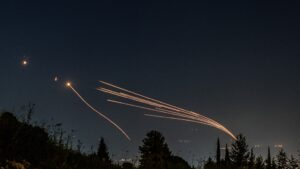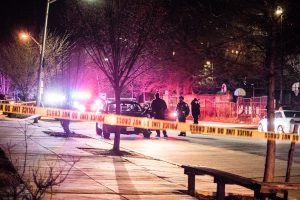This past Wednesday, during one of my almost daily walks, I found a sign on the east corner of Stevenson Road and Woodvalley Drive. That’s across the street from Chizuk Amuno, and I knew it was the east because that is the direction we face when we pray.
It said, “I can’t breathe.” I don’t know who made the sign or posted it there. Maybe it was one of you.
Here’s what happened when I saw the final words of George Perry Floyd hanging on a sign near my home in predominantly white, Jewish Pikesville. I exhaled and let out a breath I hadn’t even known I was holding.
I was relieved; relieved to know that I live, love and work alongside people who care that systemic racism is alive and well and that it has rent the fabric of our American civil society.
I was proud; proud that the protest movement had reached our Northwest Jewish enclave, which too often feels thousands of miles away from downtown Baltimore.

raise their fists in solidarity during a
Black Lives Matter rally.
(Photo by Jessica Rinaldi/The Boston Globe
via Getty Images, via JTA)
I was curious; curious as to how long that sign would remain looming on Stevenson Road before a passerby, an enemy of human dignity and peace, would tear it down.
And I felt inspired,;inspired to return home from my quiet walk and cast myself into the cacophony of social justice.
This week’s parashah records what happens when one human being wrongs another.
“God spoke to Moses saying: Speak to the Israelites: When a man or woman commits any wrong toward a fellow human being, thus breaking faith with Adonai, and that person realizes their guilt, they shall confess the wrong that they have done. They shall make restitution …” (Numbers 5:5-7)
First, this is a remarkably inclusive passage for the Bible. We often intentionally mistranslate Biblical texts to include both men and women, people of all faiths, the poor and rich alike.
This week, there is no need as the Torah makes this explicit. None of us is exempt from proper treatment of our fellow human beings. We are not focused on faith or status or gender or geography.
We are focused on all lives.
In commenting on this verse, Rabbi Yitzhak Meir Alter of Ger explains why wrongs committed toward human beings are essentially wrongs against the Divine.
“Any breach of faith toward another is an offense against God who commands justice and whose image is found in every human being’s. Why is the principle of expiation (making amends) associated here with a misappropriation of property? Every breach of faith is a form of theft, stealing another’s trust under false pretenses, using one’s God-given talents for a purpose other than that which God intended.”
Something was stolen from George Floyd and so many others. It has been taken from them because we have failed to create a society that respects the dignity and worth of every human being.
Rabbi Yitzhak Meir understands justice in the context of Genesis 1:27, which teaches that every human being is created in the image of God. How did God create humanity?
“The Lord God formed humanity from the dust of the earth. God blew into the human’s nostrils the breath of life, and the human became a living being.” (Genesis 2:7)
As a rabbi, I see the world around me through the lens of the Bible and our tradition. So when I saw that sign on Stevenson Road on Wednesday, nishmat chayim, the breath of life, is what I thought of. “I can’t breathe.” A human being with callous disregard for human life and Divine authority took away the breath of life that had been given by God to another created in God’s image.
My colleague and friend Rabbi Shai Held reminded me of the teaching of Rabbi Abraham Ibn Ezra, that from a religious perspective one who witnesses an act of oppression and remains silent is morally equivalent to the one who commits the act in the first place; there are no innocent bystanders.
Not even on Stevenson Road.
This means that I am responsible for helping to create a society that honors the dignity and worth of all human beings. You are responsible for that as well. Whether as leaders, as followers or as allies, we are all responsible for repairing the rend in our country.

Throughout history, Jews have taken different roles in the various social justice movements. Sometimes we have been leaders, as when Rabbi Abraham Joshua Heschel and others marched for justice in Selma. Sometimes we have been allies, as in the campaign for a fair wage. And sometimes we have been followers, as in the fight for marriage equality.
What role will we play now? The one role we may not play is as bystanders.
We may not stand idly by as the blood of our brothers calls out to us.
Most of us are fortunate to live easy, privileged lives. I know that some of you bristle at that word, privilege, especially white privilege. But friends, that’s what it is when you or I can walk or run down Stevenson Road without fear of anything other than cars speeding by.
On my way home from the cemetery last Friday, I passed by the corner of Stevenson and Woodvalley and checked on the sign. It is indeed still up, bearing silent witness.
But as I checked on it, I realized that I had misread it the first time. It doesn’t say “I can’t breathe,” it says, “We can’t breathe.” And more than relieved, and proud, and curious and inspired, that made me feel hopeful. Hopeful that even with so much suffering and injustice all around us, we in this country may finally have a sense of shared humanness and shared destiny.

And that gives me hope for us and for our future.
Rabbi Debi Wechsler is a rabbi at Chizuk Amuno Congregation.





